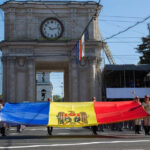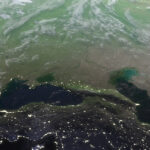Photo By 112.international
Introduction
From September 17 to 19, the Russian Federation held elections for the 450 seats of the State Duma. While the focus of many media outlets and research organizations is on election fraud, with claims of up to 14 million fraudulent votes for the ruling United Russia party, or suppression of protests following the election, the International Conflict Resolution Center is instead turning its focus towards occupied the occupied territories of Eastern Europe and Eurasia.
As a result of passportization initiatives, large portions of the populations living in Crimea, Donetsk and Luhansk, Abkhazia, South Ossetia/Tskhinvali, and Transnistria participated in these legislative elections. United Russia’s popularity has declined due to poor domestic economic conditions, prompting the government to issue passports to those residing in occupied territories in the hope of gaining votes in exchange for ‘recognition’ of occupying regimes.
Voting in the Occupied Territories of Ukraine
On April 24, 2019, Russian President Vladimir Putin signed a decree to simplify the process of granting citizenship to residents of “certain areas of Ukraine’s Donetsk and Luhansk provinces.” Through this process, residents of these regions of Ukraine were able to receive Russian passports in less than three months from the time of application, notably granting them the right to vote in Russian elections.
Beginning in June 2021, the Security Service of Ukraine (SBU) noted that “the forcible naturalization of Ukrainians has been accelerating as the invaders seek to have residents of parts of Donetsk and Luhansk regions cast their ballots in September.” According to the head of the Ministry of Foreign Affairs of the Rostov region of Russia Oleg Agarkov, nearly 640,000 Russian passports were issued to residents of Donetsk and Luhansk, indicating a mass effort for the ruling United Russia party to win additional votes to maintain their majority.
In order to ensure the participation of the more than 640,000 passport holders in the election, the authorities of the regime occupying the Donetsk region organized 825 busses and 12 trains, free of charge, to provide transportation for Russian citizens to polling stations in the neighboring Rostov region of Russia.
Regarding the elections, several international powers came to support Ukraine in its statements that the elections violated international law. Turkey, the first country to join Ukraine’s ‘Crimea Platform’ event, has voiced its opposition to Russia’s occupation, in part due to the actions that have been taken against Crimean Tatars, a Turkic group native to the Crimean Peninsula that has been discriminated by Russian authorities. According to Tanju Bilgiç, spokesperson for the Turkish Foreign Ministry, the State Duma elections have “no legal validity for Turkey.”
U.S. State Department spokesman Ned Price echoed Turkey’s remarks, noting that the United States “[does] not recognize holding elections for the Russian Duma on sovereign Ukrainian territory.” The European Union issued a similar statement, stating that the E.U. “does not recognize the so-called elections held in the occupied Crimean peninsula.”
Voting in the Occupied Territories of Georgia
Passportization in Georgia’s occupied territories of Abkhazia and South Ossetia/Tskhinvali began several years before the 2008 Russo-Georgian war, and in fact, contributed to some residents’ willingness to participate in separatist activity. For example, in 2002 before the Russian Federation changed its regulations on citizenship, 150,000 residents in Abkhazia applied for Russian passports, bringing the total number of residents of the region holding Russian passports to 200,000. Following the 2008 war, Russia stopped issuing passports to residents of occupied Abkhazia as the Russian Federation recognized Abkhazia as a separate ‘state.’
On September 20, the Russian Embassy in Abkhazia reported that 13,000 residents of Abkhazia holding Russian passports participated in the elections. The Russian Embassy in Tskhinvali reported that 3,500 votes had been cast in an early voting period in the territory. More than 90% of the population of South Ossetia/Tskhinvali, which is estimated to be around 50,000 people, hold Russian passports and are therefore eligible to vote. By the end of the regular election dates, South Ossetia/Tskhinvali had an estimated turnout of over 11,000.
In response to holding elections on occupied territory, the Georgian Ministry of Foreign Affairs issued a statement condemning the elections, referring to them as “another destructive step against Georgia’s sovereignty and territorial integrity that grossly violates the fundamental norms of international law and fully disregards the UN Charter and Helsinki Final Act.”
Voting in Transnistria, Moldova’s Occupied Territory
Moldova’s occupied territory of Transnistria has an estimated population of 469,000 (as of 2018), and as of 2019, more than 220,000 of these residents hold Russian passports.
Between September 17 and 19, 27 polling stations were opened in the occupied region for the Russian Duma elections, and according to the Supreme Council of the PMR (the government in control of the territory), 59,233 Pridnestrovians (the term Transnistria uses for residents of the territory) with Russian citizenship cast their ballots.
Prior to the election, the leader of the government in control of Transnistria, Vadim Krasnoselski, issued a statement urging the public to vote “because despite all the difficulties, Russia does not forget Transnistria and helps it as much as possible.”
In comparison to the 59,000 votes cast in the most recent State Duma elections, it was reported that just under 29,000 residents of Transnistria voted in Moldova’s recent parliamentary elections.
Unlike Ukraine and Georgia, Moldova’s pushback to foreign elections on its territory have been weak. Moldova’s reaction was made in a comment issued by the Ministry of Foreign Affairs Press Office. As noted by Vladimir Socor of Jamestown Foundation, this “is the lowest level at which the Foreign Ministry can express a reaction.” He also noted that “it was not a diplomatic note” and “the Russian ambassador was not summoned to Chisinau to give an explanation to the Ministry of Foreign Affairs.”
Conclusion
The total number of votes counted in the 2021 Russian legislative elections equaled 109,204,662. Thus, the number of votes coming from residents occupied territories is not significant in terms of swaying the national results, however, the inclusion of these votes with districts of Russia proper can contribute to the victory of United Russia, as this was the party that offered these occupied territories ‘recognition.’
What is perhaps more troubling is the continued development of social ties between the people of Russia and those residing in the occupied territories. Allowing participation in elections, distributing pensions, and issuing travel documents only contributes to the integration of occupied territories within the Russian Federation. Resolving these frozen conflicts will only become more difficult with time as the societies and their occupied territories diverge further.
The international community has condemned these elections and has issued statements supporting territorial integrity, but additional action is needed. Russia must be pressured into compliance with agreements signed with international organizations, beginning with the withdrawal of its military from Ukrainian, Moldovan, and Georgian territory.

